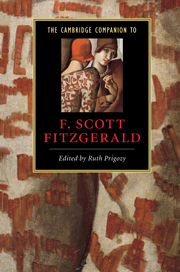Book contents
- Frontmatter
- 1 Introduction: Scott, Zelda, and the culture of celebrity
- 2 F. Scott Fitzgerald, age consciousness, and the rise of American youth culture
- 3 The question of vocation in This Side of Paradise and The Beautiful and Damned
- 4 The short stories of F. Scott Fitzgerald
- 5 The Great Gatsby and the twenties
- 6 Tender is the Night and American history
- 7 Fitzgerald’s expatriate years and the European stories
- 8 Women in Fitzgerald’s fiction
- 9 Fitzgerald’s nonfiction
- 10 Fitzgerald and Hollywood
- 11 The critical reputation of F. Scott Fitzgerald
- Bibliography
- Index
7 - Fitzgerald’s expatriate years and the European stories
Published online by Cambridge University Press: 28 May 2006
- Frontmatter
- 1 Introduction: Scott, Zelda, and the culture of celebrity
- 2 F. Scott Fitzgerald, age consciousness, and the rise of American youth culture
- 3 The question of vocation in This Side of Paradise and The Beautiful and Damned
- 4 The short stories of F. Scott Fitzgerald
- 5 The Great Gatsby and the twenties
- 6 Tender is the Night and American history
- 7 Fitzgerald’s expatriate years and the European stories
- 8 Women in Fitzgerald’s fiction
- 9 Fitzgerald’s nonfiction
- 10 Fitzgerald and Hollywood
- 11 The critical reputation of F. Scott Fitzgerald
- Bibliography
- Index
Summary
During the peak of his contemporary popularity, F. Scott Fitzgerald lived abroad - mostly in France - for five years and eight months, much of that time pursuing a frenzied social life that impeded his literary work. His European travels included lengthy stays from May 1924 through the end of 1926 and then from March 1929 through September 1931, as well as a five-month sojourn in mid-1928. On foreign shores he experienced misery and elation: his wife Zelda's romance with French aviator Edouard Jozan; completion, publication, and celebration of his third novel, The Great Gatsby (1925); new friendships with Ernest Hemingway and with Gerald and Sara Murphy; innumerable alcoholic binges and embarrassments; false starts on a fourth novel and increasing self-doubts; domestic rivalry and acrimony; Zelda's first nervous breakdown and treatment; his hotel life and fugitive magazine fiction. Only after returning to the US did Fitzgerald publish Tender is the Night (1934), a work that despite its flaws plumbs the paradoxes of desire more profoundly than did Gatsby. Understandably, Tender has preoccupied scholars and biographers seeking insight into the author's life abroad, for its thinly veiled treatment of the Fitzgeralds' domestic calamities, set against the crazy violence of post-war Europe, reveals much about the author's own identification with expatriate culture. But the many short stories set at least partly in Europe likewise merit closer attention, less for their biographical connections than for their representations of the American migration to Europe after World War I.
- Type
- Chapter
- Information
- The Cambridge Companion to F. Scott Fitzgerald , pp. 118 - 142Publisher: Cambridge University PressPrint publication year: 2001
- 2
- Cited by



